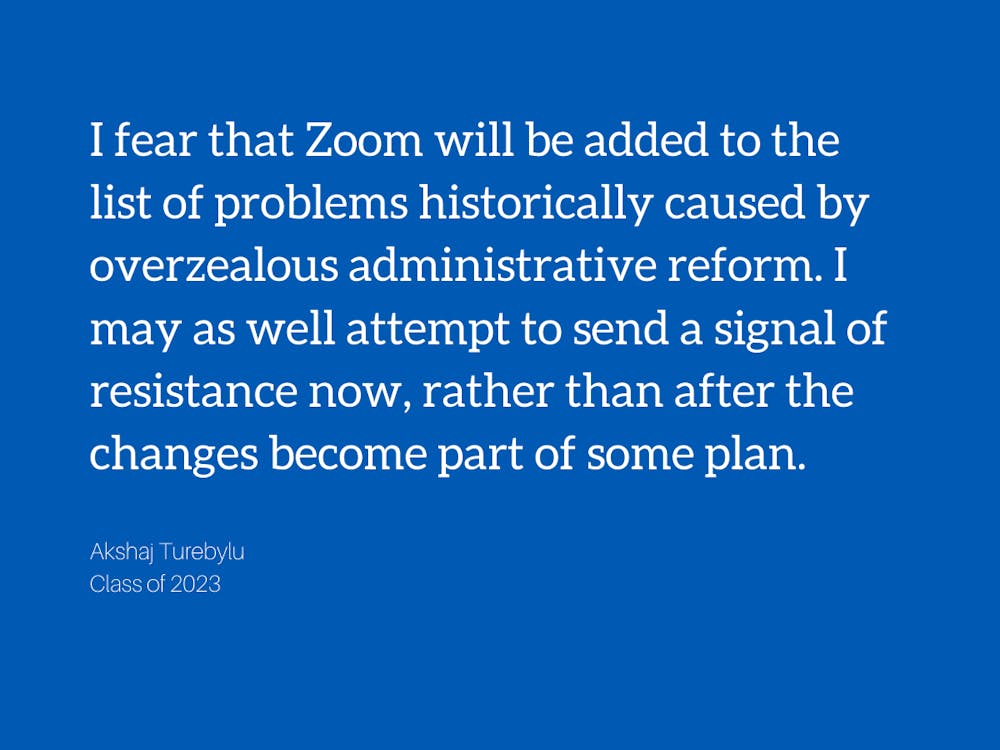Over the past few weeks, undergraduates and professors alike have worked to transition our learning experience onto Zoom. As this attempt to salvage our semester continues, however, it is important to remember that it also acts as an experiment. The widespread acceptance of the Zoom classroom across the country will spawn large sets of data regarding the efficacy of “distance learning.”
Before the results are fully in, however, I would like to pre-empt them. It appears obvious that “distance learning” can hardly be considered learning.
I fear that the results will not be indicative of the experience and reality of distance learning. I fear that administrative powers will find studies that declare online classrooms “effective” and be tempted to implement them as part of some reform. I fear that Zoom will be added to the list of problems historically caused by overzealous administrative reform. I may as well attempt to send a signal of resistance now, rather than after the changes become part of some plan.
Even taking the pulse of those close to me, I get the same result: “This sucks.” That doesn’t offer much description, but does signal to me that no one particularly enjoys taking classes online (anecdotally, of course). Common complaints range from inability to pay attention, being tired staring at a screen for extended periods of time, and feeling a lack of engagement.
I would like to preface my diatribe by saying that I am someone who enjoys online lectures, finding them to be a way to engage in content outside of class. But this only works in limited sets. Having all of my classes online degrades my ability to pay attention to any of them.
Recently, a New York Times columnist wrote a piece on the importance of live musical and theatrical performances. For them, the power and energy present in the live performance is not comparable to simply watching the event online; the great shared experience of the audience and the intensity of thousands of eyes being directed towards a single actor or musician generates something special in live performance. There is an engagement and interaction that is simply not possible elsewhere.
Teaching is essentially a performance—the professor makes a case (often in the form of lecture) whereby their body movements, gestures, facial expressions, and voice all work together to impart understanding to students in a nuanced and energetic manner. The dramatic slashing of a word on a chalkboard reveals more to the student than a set of readings might.
But not all classes are lectures. Even worse for the Zoom format are seminars, the spiritual equivalent to improvisation. Here, each student takes on a persona in the classroom and ideas are bounced around in lively and random fashion. The professor directs the energy of the room, essentially setting the beginning seed for the other characters to build off of and providing assistance when necessary. Over Zoom, however, each student becomes a muted face that cannot react or read anyone else—the energy and connection between each character is lost.
What I am trying to get across here is that Zoom is not comparable to a physical classroom. Although Zoom works as a substitute for our current situation, it should be considered a potential replacement of the physical classroom experience. Anecdotally speaking, students find it difficult to work with. From a theatrical perspective as well, Zoom fails to produce the kind of performance necessary for higher-level education. Let’s leave it behind (with gratitude!) once this is all over.
Akshaj Turebylu is a Trinity first-year. His column, ‘ways and means,’ runs on alternate Wednesdays.
Get The Chronicle straight to your inbox
Sign up for our weekly newsletter. Cancel at any time.

